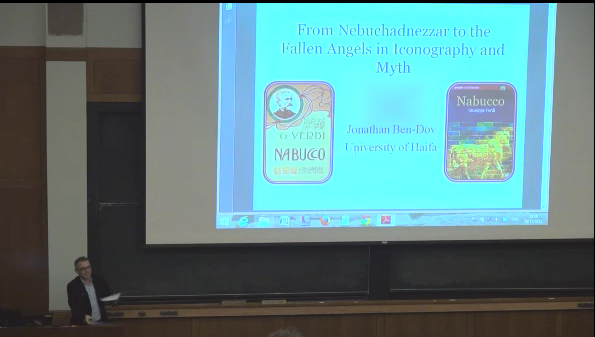Philip Harland has an ongoing series of podcasts on a wide range of topics relating to religions of the ancient Mediterranean which are available here. These include:
Series 1: Paul and His Communities
Podcast 1.1 Paul in his own words
Podcast 1.2 The situation at Thessalonica
Podcast 1.3 Paul’s response to Jesus-followers at Thessalonica
Podcast 1.4: Paul and the followers of Jesus at Corinth, part 1
Podcast 1.5: Paul and the followers of Jesus at Corinth, part 2
Podcast 1.6: Paul and the followers of Jesus at Corinth, part 3
Podcast 1.7: Paul and the situation in Galatia
Podcast 1.8: Paul’s response to the Galatians
Podcast 1.9: Paul and the situation at Rome
Podcast 1.10: Paul’s response to the Romans
Podcast 1.11: Legacies of Paul – Women’s leadership, part 1
Podcast 1.12: Legacies of Paul – Women’s leadership, part 2
Series 2: Early Christian Portraits of Jesus
Podcast 2.1: Introduction to the Gospels as Portraits of Jesus
Podcast 2.2: Mark’s portrait of Jesus – Suffering Son, part 1
Podcast 2.3: Mark’s portrait of Jesus – Suffering Son, part 2
Podcast 2.4: Matthew’s portrait of Jesus – New Moses, part 1
Podcast 2.5: Matthew’s portrait of Jesus – New Moses, part 2
Podcast 2.6: Luke’s Portrait of Jesus – Prophet Elijah, part 1
Podcast 2.7: Luke’s Portrait of Jesus – Prophet Elijah, part 2
Podcast 2.8: John’s Portrait of Jesus – Son and Word, part 1
Podcast 2.9: John’s Portrait of Jesus – Son and Word, part 2
Podcast 2.10: Hebrews’ Portrait of Jesus – Highpriest Melchizedek, part 1
Podcast 2.11: Hebrews’ Portrait of Jesus – Highpriest Melchizedek, part 2
Series 3: Diversity in Early Christianity: “Heresies” and Struggles
Podcast 3.1: Introduction to Diversity – A Schism in John’s Community, part 1
Podcast 3.2: A Schism in John’s Community, part 2
Podcast 3.3: Docetic and Judaizing Opponents of Ignatius
Podcast 3.4: Docetic and Judaizing Opponents of Ignatius, part 2
Podcast 3.5: Diversity in Asia Minor – A Regional Case Study
Podcast 3.6: Sources for the Study of Diversity – Gnostic, Apocryphal, Patristic
Podcast 3.7: Jewish Followers of Jesus, part 1 – Ebionites
Podcast 3.8: Jewish Followers of Jesus, part 2 – Pseudo-Clement
Podcast 3.9: Marcionites and the Unknown God
Podcast 3.10 Introducing Gnostic Worldviews
Podcast 3.11: Secret Book of John, part 1 – The Spiritual Realm
Podcast 3.12: Secret Book of John, part 2 – Salvation from the Material Realm
Podcast 3.13: The Wisdom of Jesus Christ and Middle Platonism
Podcast 3.14: The Gospel of Philip, part 1 – Ideas of Salvation
Podcast 3.15: The Gospel of Philip, part 2 – Ritual Enactments of Salvation
Podcast 3.16: The Gospel of Mary – Secret Knowledge from the Ultimate Disciple
Series 4: Honouring the Gods in the Roman Empire: Asia Minor
Podcast 4.1: Introduction to Honouring the Gods
Podcast 4.2: A City and Its Patron Deity – Artemis of Ephesus
Podcast 4.3: Salvation from the Gods – Asklepios at Pergamum
Podcast 4.4: Messages from the Gods – Apollo at Claros and Didyma
Podcast 4.5: Justice from the Gods in Lydia
Podcast 4.6: Honouring the Emperors as Gods
Series 5: The Historical Jesus in Context
Podcast 5.1: Studying the Historical Jesus – Sources and Problems, part 1
Podcast 5.2: Studying the Historical Jesus – Sources and Problems, part 2
Podcast 5.3: Studying the Historical Jesus – Sources and Problems, part 3
Podcast 5.4: Scholarly Portraits of the Historical Jesus, part 1 – Crossan
Podcast 5.5: Scholarly Portraits of the Historical Jesus, part 2 – Sanders
Podcast 5.6: Jesus, Galilee, and Israelite History, part 1 – To the Second Temple
Podcast 5.7: Jesus, Galilee, and Israelite History, part 2 – To the Time of Jesus
Podcast 5.8: Jesus, the Galilean and Judean
Podcast 5.9: Jesus in the Context of Educated Groups and Leaders
Podcast 5.10: Jesus and his Mentor, John the Baptizer
Podcast 5.11: Jesus as Teacher, part 1 – Method and Content
Podcast 5.12: Jesus as Teacher, part 2 – Present or Future Kingdom?
Podcast 5.13: Jesus as Healer and Exorcist
Podcast 5.14: Jesus as Prophet
Podcast 5.15: Jesus as Messianic King?
Series 6: Associations in the Greco-Roman World
Podcast 6.1: Introduction to Associations in the Greco-Roman World
Podcast 6.2: Social, Religious, and Burial Activities of Associations
Podcast 6.3: Judean and Christian Groups as Associations
Podcast 6.4: Associations and Greco-Roman Society (The City)
Podcast 6.5: Associations and the Roman Empire
Podcast 6.6: Approaches to Studying Ethnic Associations and Identities
Podcast 6.7: Phoenician Immigrant Associations, part 1
Podcast 6.8: Phoenician Immigrant Associations, part 2
Podcast 6.9: Judean Immigrant Associations, part 1
Podcast 6.10: Judean Immigrant Associations, part 2
Podcast 6.11 Jesus Groups as Associations and Cultural Minorities, part 1
Podcast 6.12: Jesus Groups as Associations and Cultural Minorities, part 2
Podcast 6.13: Cultural Minority Associations and Ethnic Stereotypes, part 1
Podcast 6.14: Cultural Minority Associations and Ethnic Stereotypes, part 2
Series 7: Visions of the End: Origins of Judean Apocalypticism
Podcast 7.1: Visions of the End – What is Apocalypticism?
Podcast 7.2: Origins part 1 – Ancient Near Eastern Combat Myths
Podcast 7.3: Origins part 2 – Zoroastrian apocalypticism
Podcast 7.4: Origins part 3a – Israelite Prophets 1
Podcast 7.5: Origins part 3b – Israelite Prophets 2
Podcast 7.6: 1 Enoch – An Introduction to the Earliest Apocalypse
Podcast 7.7: 1 Enoch – Fallen Angels in Early Apocalypticism
Podcast 7.8: Introduction to Daniel’s Historical Apocalypse
Podcast 7.9: Daniel’s Visions as Veiled History
Series 8: A Cultural History of Satan – Personified Evil in Early Judaism and in Christianity
Podcast 8.1: A Cultural History of Satan – Predecessors of Satan from Mesopotamia
Podcast 8.2: Predecessors of Satan from Canaan and Israel
Podcast 8.3: Predecessors of Satan from Persia
Podcast 8.4: Other Predecessors of Satan from the Hebrew Bible
Podcast 8.5: Fallen Angels in 1 Enoch (ca. 225 BCE)
Podcast 8.6: Mastema in Jubilees and Beliar in the Dead Sea Scrolls (ca. 100 BCE)
Podcast 8.7: The Devil and Beelzebub in Early Biographies of Jesus (70-100 CE)
Podcast 8.8: Internal Functions of the Rhetoric of Satan in Paul and John (ca. 50-110 CE)
Podcast 8.9: A Satanic Empire in John’s Apocalypse (ca. 80-100 CE)
Podcast 8.10: Jealous Satan, the Image of God, and the Serpent in the Life of Adam and Eve
Podcast 8.11: The Jealous Creator and the Serpent of Wisdom in Gnosticism (2nd century CE)
Podcast 8.12: Satan’s Demons and the Greco-Roman Gods in the Church Fathers (2nd-3rd centuries CE)



